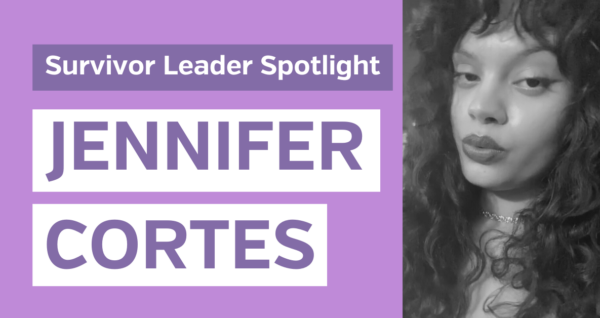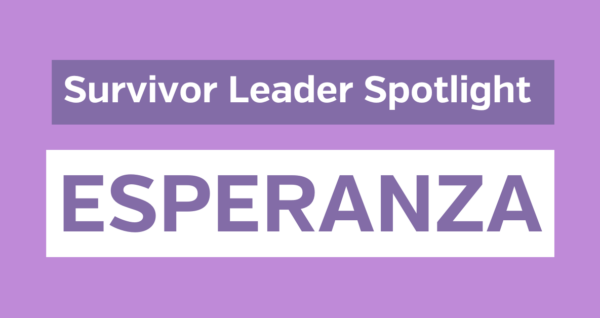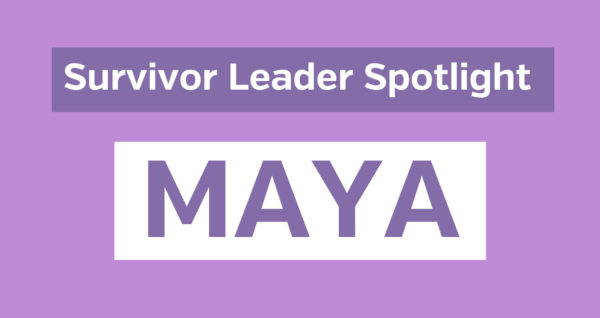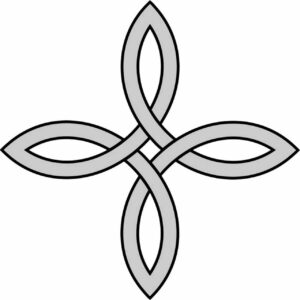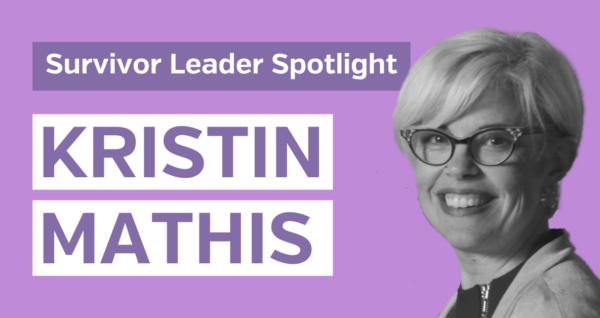“We all give each other strength and support, and when we work together, we make change happen through our pain.”
This Domestic Violence Awareness Month (DVAM), we’re spotlighting some of our incredible Survivor Leaders, former clients of Sanctuary who go through a 12-week training and certification course to prepare them to make system-wide change through advocacy, training, program development, and working directly with other survivors.
Fellow Survivor Leader Jessica Muñoz sat down with Jennifer to discuss her advocacy work and more.
Can you tell me about some recent advocacy work you’ve been involved in, and which moments have been the most impactful to you?
The recent advocacy work I have been a part of was the FBI Employee Mental Health Fair and Brides March. The moments that have been most impactful to me were when I was in the fair, and I was educating a lady on Mental Health and learned that she wanted to give back to the community with her beauty services. I was a bit shocked because that’s one of the projects I was working on, and this was definitely an opportunity to work together to offer as much as possible to the community.
Another moment was in the Brides March when the family of the woman whom the March was dedicated to was speaking on how one should be able to leave a situation and not have it follow them. These words sent chills down my spine because it’s very true and it reminded me of my personal experience and what many survivors go through today.
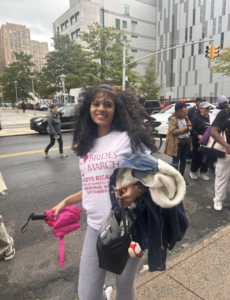
Tell me about a time you felt beautiful? Can you link this to a moment in your healing and compare it to a time you did not feel beautiful?
When I was 15, I was in the Mac store with my mother, after school shopping. I was getting a makeover and when I looked in the mirror my self-esteem immediately rose and I felt so beautiful. I didn’t feel scared anymore to go to high school and deal with bullying. It felt like a shield like I can face anything. Before this moment, I always felt subconscious about myself because of the bullying I would go through in middle school. Now till this day I use beauty as a way to take my power back and reinvent myself.
You work in the beauty industry. Do you think the beauty salon is a good environment to discuss intimate partner violence?
I think it is because beauty is a form of healing. If you have a beauty professional that you trust it can be a moment to open up and the beauty professional could seek resources to give. Beauty professionals often see signs of abuse with marks on the body and missing spots of hair. It would be better if all beauty professionals got trained on domestic violence and how to handle it in a matter that keeps the clients, the staff and the salon safe.
Check out Jennifer’s beauty business on Instagram at @lashodite.
Do you like the idea of bringing advocacy to the beauty salon, and in your opinion, what is the best way to connect with someone? Just to begin a conversation and let the client talk as you do their lashes? How do you make someone feel comfortable talking to you?
Yes, I like the idea of advocacy in a beauty salon. The best way to connect with someone is making them feel comfortable first by asking them about their day and if they are comfortable in the chair and then giving them the space to ask you questions and talk about what’s on their mind. I always smile and be kind. I believe that clients read my energy and feel safe around me.
As a bilingual Latina woman can you tell me what we should be doing to reach our Spanish speakers in this city and let them know about options they have to overcome gender-based violence?
I think it’s important to team up with Spanish-speaking advocates who can share the resources that are needed for domestic violence and translate any resources that are not in Spanish (internet resources).
“La violencia de género es muy serio. Estoy en contra y creo que es importante educar a todos sobre las señales, la historia, los daños que causa y los recursos disponibles.”
Has your identity as Puerto Rican woman affected how you might approach advocacy work? Do you think we’ve missed anything concerning catering to our Latine survivors?
It has affected me a bit because I know sometimes I try to give resources and sometimes the women are culturally house wives who are rarely alone so I have to do it in a moment when their significant other steps out or is busy. Sometimes they feel stuck because they have lived most of their lives with their significant other and make decisions with them. The best thing to do is have them memorize the number of the domestic violence hotline in an easy way at a safe time.
Overall in your option, what do people get wrong or think wrong when it comes to domestic violence?
People often believe that men do not get abused and that people choose their situation. Men have feelings and deserve respect. Education on domestic violence empowers you to see manipulation and abuse and allows you to seek help.
Have you enjoyed the experience of being a survivor leader and connecting with other survivor leaders? I ask this because I have so enjoyed going to advocacy events with you and getting to know you.
I have enjoyed my experience and I know I will continue to enjoy it. I feel that my presence and the presence of my group have allowed us to educate and spread awareness. It has also allowed us to become stronger as one because we all give each other strength and support and when we work together we make change happen through our pain.
I really admired your writing in the narrative therapy workshop we did together as survivor leaders, can you tell me a little more about that experience and how it felt for you?
Narrative therapy helped me be more aware of how I perceive other people’s quotes and art and helped me be more open minded. Also, it showed me where I needed a bit more work and where I have healed.
Join Jennifer in standing with survivors of gender violence. Your gift supports Sanctuary’s life-saving work with thousands of families escaping abuse.
